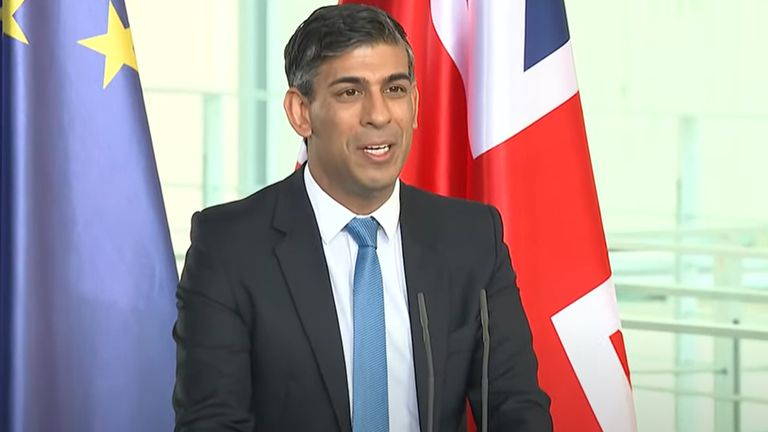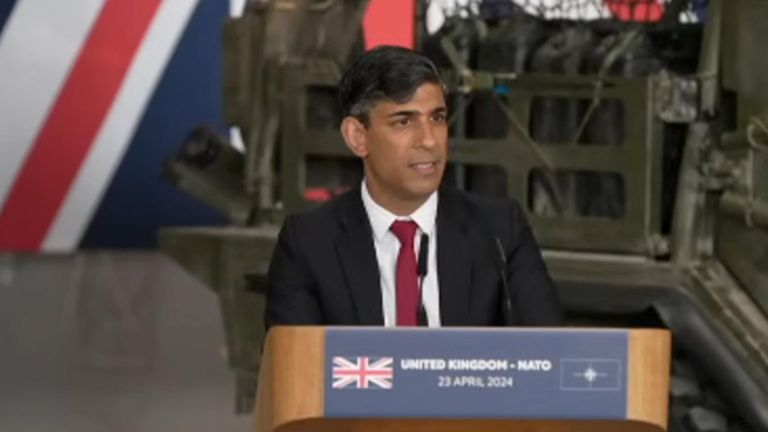Sir Keir Starmer’s Defence Strategy Sparks Division in Labour Party, Diverging from Corbyn’s ‘Stop the War’ Stance
Rishi Sunak has unveiled a completely funded proposal to elevate the UK’s annual defense spending to 2.5% of the national income during the next five to six years, posing a challenge for Labour.
A warning has been given to us. Prime Minister Rishi Sunak’s pre-election pitch to voters this week was to place the nation on a “war footing.”
On a lightning visit to Poland and Germany, countries redolent of bloody war in Europe, he announced “a completely funded plan” to raise annual UK defence spending to 2.5% of national income over the next five to six years.
Twenty-five years ago this week, another UK prime minister also had war fighting on his mind.
Tony Blair flew to the US to deliver one of the defining speeches of his 10 years in power. His immediate task was to persuade a reluctant President Bill Clinton to commit to NATO’s defence of Kosovo against Serbian aggression.
He set it in the context of a broader ideology which became known as “humanitarian” or “liberal interventionism”.
“We are all internationalists now, whether we like it or not,” he told the Chicago Economic Club, gathered in a dingy hotel ballroom with a global TV audience. “We cannot turn our backs on conflicts and the violation of human rights within other countries if we still want to be secure.” Defence Strategy Sparks Division in Labour Party
The contrast in tone is stark between Mr. Blair’s positive argument for the use of force in some circumstances and Mr. Sunak’s urgent plea that “we must do more to defend our country, our interests, and our values.”
The UK’s military options have darkened and narrowed since April 1999. The point was encapsulated by Defense Secretary Grant Shapps when he observed that our times had moved “from post-war to pre-war.”
Mr. Blair was speaking during what some called the “unipolar moment,” when the US was considered to be the only global superpower, 10 years before the Iron Curtain came down, heralding the collapse of the Soviet Union.
China seemed anxious to join the world order, which had been established by Western democracies since 1945. In what were essentially wars of choice, the UK had successfully projected its forces to liberate the Falkland Islands and Saddam Hussein’s Iraqi forces had been ejected from Kuwait.
The events that followed did not support Blair’s stance.
Mr. Blair’s Chicago speech celebrated that “our armed forces have been busier than ever—delivering humanitarian aid, deterring attacks on defenceless people, backing up UN resolutions, and occasionally engaging in major wars.”.
In agreement with him, Kofi Annan, the UN secretary-general at the time, proposed reconsidering UN articles to enable greater “interventions” in the context of a globalized world. Defence Strategy Sparks Division in Labour Party
The events that followed did not validate Mr. Blair’s perspective for numerous people.
There was widespread support for the invasion of Afghanistan after the 9/11 terror attacks on America in 2001, but the UN did not endorse George W Bush and Mr Blair’s expansion of the war on terror to invade Iraq.
In the long term, the military interventions in Afghanistan and Iraq did not bring about the desired outcomes, resulting in unstable, undemocratic countries.
Scepticism about intervention
By 2010, there was no public support in the UK or US for “boots on the ground” when instability spread to Libya and Syria, although some aerial operations continued.
The House of Commons’ substantial doubt prevented a missile retaliation against the Assad regime for its chemical weapons assault in the Syrian conflict in 2013.
Following the alleged expenditure of the “peace dividend,” Mr. Blair delivered his Chicago speech. Defence Strategy Sparks Division in Labour Party
Defense spending was down from the 4% of GNP (gross national product) it had been during the Falklands War and when the Berlin Wall fell. UK defence spending, however, was still comfortably above the 2% target expected of NATO members.
Pessimism growing around UK’s ability to defend itself
Since the credit crunch of 2007/8, our defence spending has plunged close to the NATO minimum. Mr Sunak’s announcement would only increase defence spending to the level of the Blair years.
Over the past 2000 years, the workforce in the British military has decreased by 30%, moving from a total of 134,000 to 72,000 by the next year. The army has not been this small since the Napoleonic Wars of the 1800s.
Pessimism has grown about the UK’s diminishing armed forces and our ability to defend ourselves. Defence Strategy Sparks Division in Labour Party
In a major report earlier this year, MPs on the cross-party Defence and Security Committee reported: “The government risks being unable to build true warfighting and strategic readiness because of the sheer pace of operations, which could threaten the security of the UK. All three services have growing capability shortfalls.”
The doubt about the UK’s military dominance has grown.
The statement made by Ben Wallace, the former defence secretary, caused a stir when he disclosed that a senior American general had privately expressed doubts about the UK’s military capabilities.
He and his deputy, the armed forces minister James Heappey, have endorsed Mr Sunak’s plan but they are both quitting politics and believe spending should go up further than 2.5%.
The top generals claim the army is becoming too small to fulfill its functions. Sir Patrick Sanders, the former head of the British Army, has called for a significant expansion of civilian “reserve” forces. Defence Strategy Sparks Division in Labour Party
Manpower is not everything. Advanced technology cuts the numbers needed and can enhance fighting capacity.
The UK is 29th in the world for the size of its military but rated sixth for its firepower, behind only the US, Russia, China, India and South Korea. Either way, personnel and weapons cost money.
Tories trying to open up election divide
The Conservatives are trying to open up an election dividing line with Labour over defence spending.
But Sir Keir Starmer has repeatedly stressed his patriotism and his commitment to the defence of the realm. He is not Jeremy “Stop the War” Corbyn.
The Labour leadership has stated that they aspire to “2.5%” spending, but they have not committed to revealing the funding plan until they gain control.
Meanwhile, Mr Sunak’s spending plan has not convinced independent experts.
The Institute for Fiscal Studies doubts he could find extra money for defence while still cutting taxes and without deep cuts in other spending.
Campaigning promises are perhaps easier to make when polling suggests the Conservatives are unlikely to have to pick up the pieces after winning the election.
Middle East events justify government choices about using armed forces
Convincing the electorate of the need to spend more on defence may not be too difficult for either Mr Sunak or Sir Keir.
In Chicago, Mr. Blair seemed almost to be making a hypothetical case when he said, “We have learned twice before in this century that appeasement does not work. If we let an evil dictator run unchallenged, we will have to spill infinitely more blood and treasure to stop him later.”
As awful as subsequent events have been in the Middle East, with hindsight, they did indisputably justify the choices that UK governments made about using their armed forces.
Participation is no longer an individual decision.
Now war has arrived again on European soil. Russia has launched an unprovoked attack on Ukraine and is issuing vicious threats against Ukraine’s allies, including the UK.
As of yet, NATO members are holding back from joining the fight. Even so, military aid for Ukraine has placed significant demands on UK defence spending. Involvement is no longer a personal preference.
Public opinion is preparing for the worst. Defense Strategy Sparks Division in Labour Party
In 53% of countries, a majority of those questioned believe another world war is likely to occur in the next 5 to 10 years.
Read more:
A Reflection on Rishi Sunak’s Reset Week and Charting a Path Forward
Sydney Jewish Campaign Walk Cancelled
Rishi Sunak Warns of Increasing Threats as Defense Budget Is Boosted












